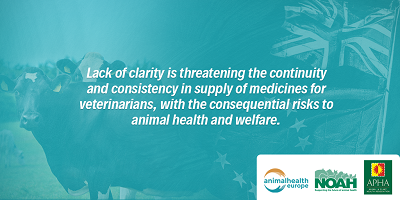Position: Protecting animals, their health, and our food supply across Europe
The EU and the UK must do everything in their power to secure an agreement on key medicine provisions before the end of the Transition Period, to protect animals, their health and our food supply through the continued supply of animal medicines.
Governments and pharmaceutical companies across Europe have been focused on responding to COVID-19, and the animal health and veterinary sector have also been very involved in this response. This has been an especially challenging time for our member companies who have been working tirelessly to ensure supply chains continue to remain robust in the face of global disruption and unprecedented demands for veterinary medicines, under worldwide lockdown conditions. Our veterinarian counterparts and farming community have been particularly affected, and our member companies have done their utmost to support them with a continued supply of products and services despite the disruption.
Now, with only a short period of time until the end of the Transition Period and given the uncertainty of the arrangements that will be in place from January 2021, risks to animal medicines supply appear again on the horizon. Our member companies have done what they can to prepare for an unknown future EU-UK relationship, following guidance from the European Medicines Agency and governments. COVID-19 has somewhat heightened that challenge with delays to negotiations, and there are many unanswered questions that hinder further planning.
This time our concern is compounded, with additional pressure due to COVID-19 and the added uncertainty about how the Northern Ireland Protocol will be interpreted and implemented, in terms of what this will mean for our companies’ medicines supply chains.
We ask both the EU and UK to agree and implement practical solutions as a matter of urgent priority, so that animal health companies may ensure continued, uninterrupted supply of their medicines for animals from 1 January 2021.
AnimalhealthEurope, NOAH (UK) and APHA (Republic of Ireland) recognise the challenges to securing an agreement in the timescale left for the negotiation. However, to maintain an uninterrupted supply of animal medicines, ensure the continued veterinary care of animals, and safeguard the production of animal-source food products, it is vital that the two sides reach an agreement on animal medicines before the end of the Transition Period.
We are asking for a swift resolution to these pressing issues, and believe the EU and the UK should:
1. Ensure mutual recognition in the animal medicines sector
a) Agree on a set of rules that would see all animal medicines – whether they are made in the UK or EU – accepted by both parties without the need for duplicative controls, primarily:
– Mutual Recognition of Good Manufacturing Practice (GMP) certificates issued by either UK or EU,
– Mutual Recognition of batch testing certificates issued by a manufacturer based in either EU or UK.
b) develop a comprehensive confidentiality agreement between regulators, including commitments to cooperate on pharmacovigilance and to facilitate information sharing and enable regulators to act promptly to safeguard animal safety and welfare.
2. Ensure a seamless movement of goods across EU borders with the United Kingdom
Facilitate via a free trade agreement or other, smooth movement in either direction, with attention to logistical bottlenecks, including paperwork, customs inspections, transportation procedures, etc.
In a recent survey of member companies, all surveyed anticipate problems with the movement of products across the EU/UK border (in either direction), for example: around logistics in ports; increased workloads; and potential delays.
3. Ensure that a seamless supply of animal medicines can be provided in Northern Ireland from the end of the transition period
Under the terms of the Northern Ireland Protocol, certain provisions of EU law will remain applicable in the UK in respect of Northern Ireland, and, crucially, this includes much of the EU’s legislation on veterinary medicinal products. There is no clarity on how the Northern Ireland Protocol will be implemented, including the detail of regulatory requirements and the customs procedures and checks required for the movement of products from Great Britain to Northern Ireland, following the end of the Transition Period on 1 January 2021. This lack of clarity on what is required is now threatening not only the continuity and consistency in supply of medicines to veterinarians, but also to farmers and other animal owners, with the consequential risks to animal health and welfare.
At least 50% of companies surveyed in our aforementioned survey anticipate problems with continuing supply of animal health products to Northern Ireland under the Northern Ireland Protocol. With no meaningful guidance being published to date, some companies note that it could take from 3 to 9 months to adjust supply chains.
4. Allow for safe transport of companion animals
Ensure clarity and respect of any changes to pet travel rules as soon as possible to help vets manage demand from pet owners in both the UK and the EU. Here clear and adequate communications tools are much advised.
We remain committed to achieving a broader negotiated outcome that would benefit many businesses and sectors including tariff free access, simplified rules of origin, data adequacy agreements, mutual recognition of professional qualifications, strong Intellectual Property provisions, free movement of skilled workers, etc.

